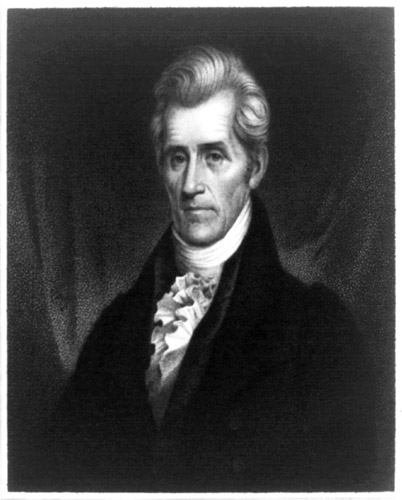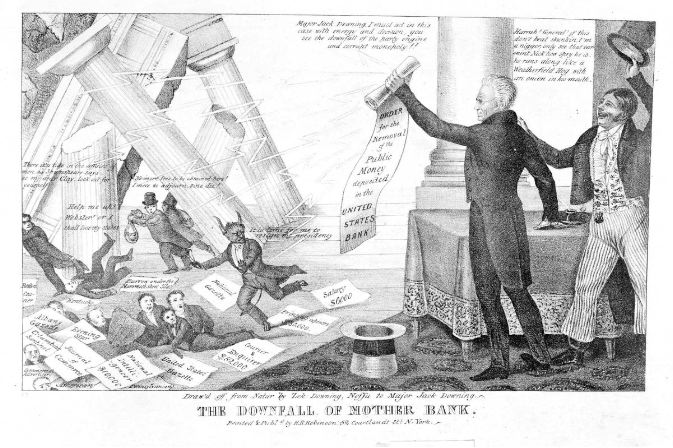
President Jackson’s Veto Message Regarding the Bank of the United States; July 10, 1832
 One of the “Essential Documents” featured in The Patriot’s History Reader, Essential Documents for Every American (reviewed here), is President Jackson’s veto message. Messrs Schweikart, Dougherty, and Allen point out, in their introductory remarks, the shift in the Democratic party over time with respect to the concept of a central bank.  Not renewing the banks charter represented
One of the “Essential Documents” featured in The Patriot’s History Reader, Essential Documents for Every American (reviewed here), is President Jackson’s veto message. Messrs Schweikart, Dougherty, and Allen point out, in their introductory remarks, the shift in the Democratic party over time with respect to the concept of a central bank.  Not renewing the banks charter represented
… a populist victory over wealthy interests, but the bank made its reappearance in 1913 as the the Federal Reserve Bank, again a private corporation but one functioning without oversight either by Congress or the executive branch as was exercised on the Bank of the United States. Interestingly enough, a Democratic president, Jackson, killed the Bank in  1832; and a Democratic president, Woodrow Wilson, with a straight party-line vote in Congress, created the Federal Reserve.
The editors also state that some of Jackson’s arguments and objections to the bank, were tenuous at best, and probably more the result of party politics than genuine concern. Nevertheless, in reading the Jackson’s words, one has to wonder if perhaps his concerns were amply justified with regard to today’s Fed.
While Jackson’s veto is worth reading in its entirety for historical and cautionary reasons, this passage stands out in sharp relief.
It is to be regretted that the rich and powerful too often bend the acts of government to their selfish purposes. Distinctions in society will always exist under every just government. Equality of talents, of education, or of wealth can not be produced by human institutions. In the full enjoyment of the gifts of Heaven and the fruits of superior industry, economy, and virtue, every man is equally entitled to protection by law; but when the laws undertake to add to these natural and just advantages artificial distinctions, to grant titles, gratuities, and exclusive privileges, to make the rich richer and the potent more powerful, the humble members of society-the farmers, mechanics, and laborers-who have neither the time nor the means of securing like favors to themselves, have a right to complain of the injustice of their Government. There are no necessary evils in government. Its evils exist only in its abuses. If it would confine itself to equal protection, and, as Heaven does its rains, shower its favors alike on the high and the low, the rich and the poor, it would be an unqualified blessing. In the act before me there seems to be a wide and unnecessary departure from these just principles.

In spite of the veto representing “a populist victory over wealthy interests,” Jackson does not appear to castigate the rich merely for being rich. His words are not a clarion call to class warfare. Unlike today’s rhetoric, Jackson’s focused on the correct role of government – “equal protection” under the law for “the high and the low, the rich and the poor.”
 The posts are coming!
The posts are coming!

1 comment
Keep up the good work!! Thanks
[Reply]
Leave a Comment